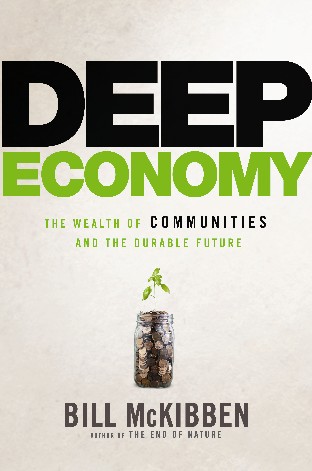
Having two dollars is better than having one. Strong economic growth is good for the economy. Having more choices is better for consumers. More money, faster growth, these are that will make the world better. Bigger is better, right? These might seem like obvious statements, but they express a deeply held assumption, an assumption that Bill McKibben shows is deeply flawed in his new book Deep Economy.
Deep Economy shows more has now become the problem.
[G]rowth is no longer making most people wealthier, but instead generating inequality and insecurity. And growth is bumping against physical limits so profound – like climate change and peak oil – that continuing to expand the economy may be impossible; the very attempt may be dangerous. But there’s something else too, a wild card we’re just now beginning to understand: new research from many quarters has started to show that even when growth does make us wealthier, the greater wealth no longer makes us happy.
He lays out the drastic consequences of continuing to pursue infinite growth. Millions dead from global warming, wars over ever smaller water reserves, power outages, rising seas, famine, conflict and destruction. I found myself thinking about this book during the day while I worked. McKibben’s style of using real world examples coupled with scientific studies and his own life experiences makes for compelling reading. It crawls into your head and forces you to look at the world in a different way. Borrowed from the ecological concept of deep ecology, Deep Economy calls for economics to mature and take into account such things as sustainability and human satisfaction.
In The End Of Nature, published in 1989, McKibben was one of the first to raise concern about global warming. A decade and a half after that prescient warming Deep Economy lays out a way to solve thous problem, calling for a radical re-shifting of our ideas of prosperity.
What is the point of getting richer if it doesn’t make you happier? Why do we think infinite growth is possible or even desirable? Why do we think its OK to get rich while making other people suffer? Why do we buy the big house and then spend all of our time at work trying to pay for it? Why do most of the apples in New York come from California, when New York state produces more than enough? Why do we get all of our news from giant companies thousands of miles away from where we live that know nothing about us? Why don’t we know our neighbors names? Why do we work an hour from where we live? Why do we get most of our energy from thousands of miles away, often in countries that are hostile to us? Mckibben exposes these problems as symptoms of the disease of trying to achieve infinite growth.
At his best when he is proposing solutions to problems, Mckibben has a rare ability to think through a problem and then suggest a plausible and workable solution (all in 261 pages). The answers he gives are both exciting and hopeful. Think local, think community. Rebuilding our local economic infrastructure, and doing it while strengthening our community leads to durable sustainable economies and happy people. This book does not call for everyone to drop out of society and join a communist commune. He is not calling for no growth, just very slow, and sustainable growth, built around a local economy and community. This is not just idle musing, McKibben presents real world examples of places around the world that have made these changes and made them work.
Bill McKibben has again shown us a way forward through the dark forest of our times. Deep Economy may be one of the best books published this year, and well worth reading.
McKibben is currently on a book tour, catch his schedule here.
2 thoughts on “Book Review – Deep Economy”
Comments are closed.